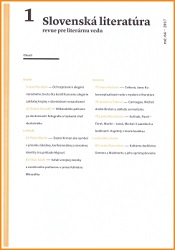Vzťah verejnej mienky a naratívneho prehovoru v próze Kálmána Mikszátha
The Relation between the Public Opinion and the Narrative Utterance in Kálmán Mikszáth´s Fiction
Author(s): Tibor GintliSubject(s): Semantics, Hungarian Literature, Western Slavic Languages, 19th Century
Published by: SAV - Slovenská akadémia vied - Ústav slovenskej literatúry SAV
Keywords: anecdotal narration; oral narration; narrative levels; direct quotations; free indirect speech; implied author; metafiction;
Summary/Abstract: Anecdotal narration outlived the 19th century in Central Europe and its new forms lead to some of the definitive works of modern literature, as Hašek’s world renowned Švejk proves. Anecdotal narratives from the 19th century were governed by collective systems of values and thus did not conform to the more individual outlook of modernity. Thus separation from these collective outlooks seemed to be a requisite for the continuation of the anecdotal tradition. The emblematic figure of the 19th-century anecdotal narration in Hungary was Kálmán Mikszáth. The study examines the hidden narrative methods that allow the narrator, and the implied author to move away from the common opinions they seemingly uphold in Mikszáth’s works. The paper concludes that those of Mikszáth’s narrative that turn away, or simply keep a distance from the common opinion paved the way for the modernisation of anecdotal narrative forms in Hungarian literature.
Journal: SLOVENSKÁ LITERATÚRA
- Issue Year: 64/2017
- Issue No: 1
- Page Range: 63 - 72
- Page Count: 10
- Language: Slovak

